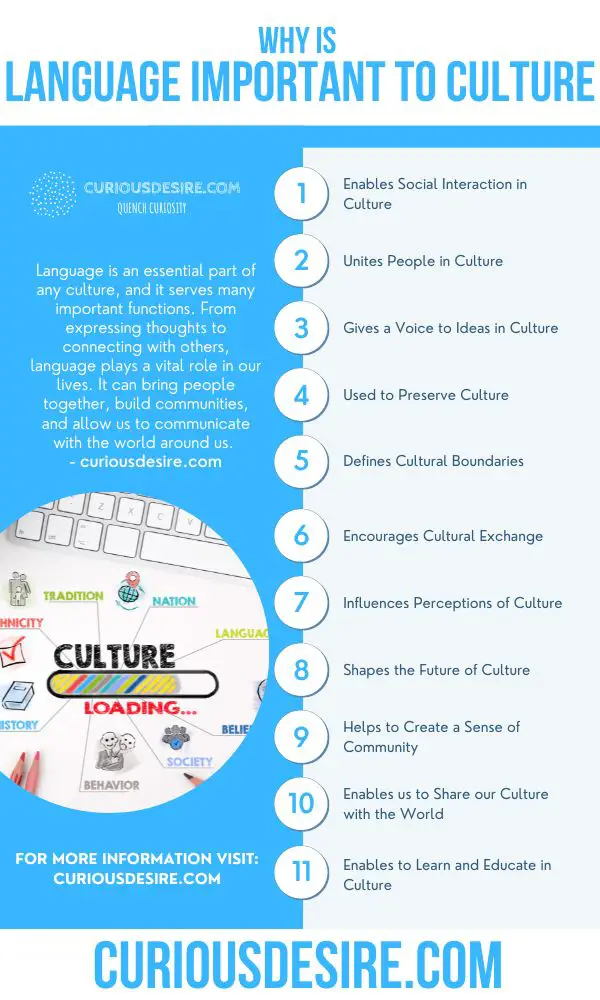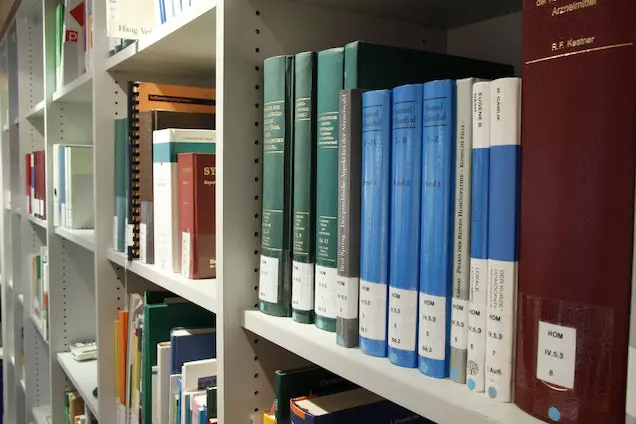Language is an essential part of any culture, and it serves many important functions. From expressing thoughts to connecting with others, language plays a vital role in our lives. It can bring people together, build communities, and allow us to communicate with the world around us.
We can gain a better understanding of our culture and the people within it through language. In this article, we’ll explore why is language important to the culture and how it serves as a powerful tool in many ways.
15 Benefits of Language in Culture
Language in culture is important because it is the basis for communication. It can be used to share ideas, build relationships, and create understanding. Here are some of the benefits language brings to culture:
1. Language Enables Social Interaction in Culture
Language allows people to interact with each other in meaningful ways. With words, people can express their feelings, beliefs and opinions. This is how cultures develop and form relationships between their members.
For instance, if someone visits a new country, they can learn the local language and engage with the people living there. With this understanding, they can learn about the different cultures that make up the country.

2. Language Unites People in Culture
When people have a common language, it helps bind them together as a culture. It gives them a shared understanding of one another and creates a sense of unity within the community. This is because language brings its own unique meanings and interpretations that only people within the same culture can understand.
Through language, people can express their individual identities and explore how they fit in with the other members of their culture.
3. Language Gives a Voice to Ideas in Culture
Language gives us the power to articulate our thoughts and ideas in words. It allows us to communicate complex concepts that would otherwise be difficult or impossible to convey without words. This is why language is so important in culture.
When we are able to communicate our ideas clearly, we can have meaningful conversations and debate topics of importance to the culture. This helps us understand different perspectives and find solutions that benefit everyone.
4. Language Can Be Used to Preserve Culture
Language can be used as a tool to preserve and promote culture. Through storytelling, poems, songs and other forms of expression, language can be used to pass down customs and traditions from one generation to the next.
This helps keep a culture alive and relevant in today’s world. It also creates an appreciation for the past and allows us to understand how our culture has evolved over time.
Suggested Readings
Importance of Language in Communication
Importance of Language in Society
5. Language Defines Cultural Boundaries
A language is a powerful tool for defining cultural boundaries. It allows us to determine who belongs within our culture and who does not. This can be done through language differences, dialects, accents or other markers of identity.
For example, people may identify as part of the same culture if they share a common language or dialect. This helps create a sense of belonging within the community and strengthens the shared identity of its members.

6. Language Encourages Cultural Exchange
Language also encourages cultural exchange and interaction. By learning the language of another culture, we can gain insight into their beliefs and customs. This helps us build relationships with people from other cultures and understand each other better.
It is through language that we can open our eyes to different perspectives and learn from one another.
7. Language Influences Perceptions of Culture
Language can also influence the way we perceive culture. For instance, if someone is unfamiliar with a certain language, they may form negative stereotypes about the people who speak it.
However, when someone takes the time to learn and understand the language, their view of the other culture can change. This helps break down cultural barriers and encourages mutual respect between people of different backgrounds.
8. Language Shapes the Future of Culture
Language shapes the future of culture. It helps us understand our past and make sense of the present. By using language, we can also shape our own vision for a better future.
Through language, we can express our hopes, dreams and aspirations in words. This is how cultures come together to create something greater than the sum of their parts. For instance, language can be used to develop a shared national identity and build bridges between cultures.
9. Language Helps to Create a Sense of Community
By speaking the same language, people are able to express themselves in a way that is meaningful and familiar. This creates an emotional bond between them and strengthens their connection with one another.
It also encourages people to come together and celebrate their culture, which can lead to positive change. From small everyday conversations to grand speeches, language is an integral part of any culture and is essential for its growth and development.
10. Language Enables us to Share our Culture with the World
With language, we are empowered to spread our culture across the globe. We can use it as a way to spread knowledge and appreciation of different cultures.
By engaging in conversations and exchanging ideas, we can create opportunities for collaboration and mutual understanding between different societies. This helps promote global acceptance and encourages us to be more open and accepting of other cultures.

11. Language is the Lifeblood of Culture
Language is integral to culture. It helps us connect with one another and express our thoughts, beliefs and emotions in a way that is meaningful and powerful.
Without language, it would be difficult to pass down customs from generation to generation or build relationships with people from other cultures. Language allows cultures to evolve and thrive, enabling us to share our values and celebrate the beauty of different cultures.
12. Language Enables to Learn and Educate in Culture
Language helps us share knowledge, ideas, and beliefs. It allows us to pass on information from generation to generation, which helps educate the next generation about their culture’s history and customs.
For instance, language can be used to teach the next generation about their culture’s values and heritage. This helps preserve tradition, encourages respect for the past, and enables us to learn more about our own culture as well as those of other cultures.
Suggested Readings
Importance of Language Learning
Importance of Language in our Life
13. Language Facilitates Knowledge Sharing in Culture
Language allows us to share knowledge from one generation to another. This helps preserve ideas and values from past generations, which can be used to shape our understanding of the world today.
We can also use language to share knowledge with people from other cultures. By learning the languages of other cultures, we can gain a better understanding of their values and beliefs. This facilitates mutual understanding and respect between different societies.

14. Language is an Expression of Culture
A language is also a form of self-expression and creativity. It allows us to express our thoughts, feelings and emotions in a way that is meaningful and powerful.
By using language, we can create stories and poems that convey the beauty of our culture. We can also use it to express ourselves politically and socially, which helps us make a positive impact on our society. Language is an essential part of any culture and is essential for its growth and development.
15. Language is a Unique Element of any Culture
Language is unique to each culture. It reflects the values, beliefs and customs of a particular society and can be used to distinguish one culture from another.
Every language contains its own nuances, complexities and expressions, which sets it apart from other languages. This makes language an important part of any culture, as it helps define its distinct identity.
For instance, dialects are used to differentiate one region from another and can be a source of pride for a particular group. Language is an integral part of any culture, as it helps to preserve its unique identity, share knowledge and promote understanding between different societies.
16. Language is the Essence of Any Culture
At its core, language is the essence of any culture. It binds us together and helps us to communicate, express ourselves and share our thoughts with one another.
It also serves as a vehicle for passing down knowledge from generation to generation, which ensures that cultural customs and values are preserved. Language is an invaluable part of any culture, as it allows us to connect with others and appreciate the beauty of different cultures.
Conclusion
Language is an integral part of any culture and has many uses. It helps us to communicate, express ourselves, share knowledge, learn about other cultures and preserve our own cultural values.
Language is the essence of any culture and is essential for its growth and development. Language binds us together and allows us to appreciate the beauty of different cultures. It is a valuable tool for expressing our thoughts, feelings and emotions and serves to unite us all.
What do you think about the role of language in culture? Share your thoughts with us in the comments below.
Relevant Readings
Importance of Language in Communication
Importance of Language in Society